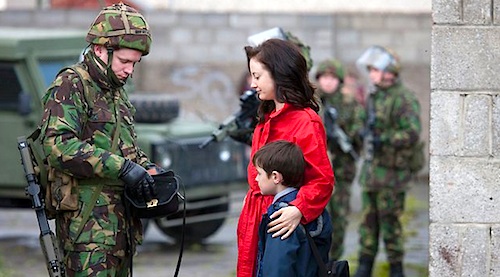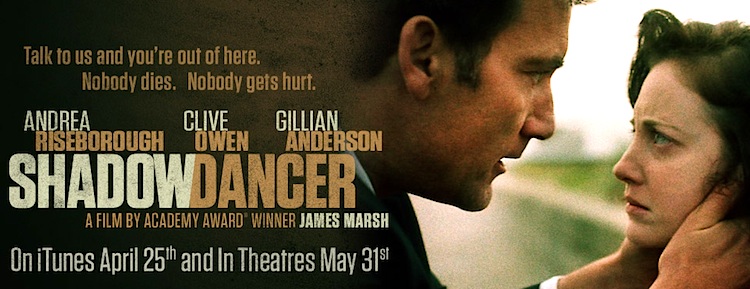By Patricia Ducey. Shadow Dancer takes place in 1993 Belfast during the fitful, bloody denouement of the conflict referred to delicately as The Troubles. In the opening minutes, we meet Colette McVeigh as a child. She sends her little brother out for cigarettes, when her father told her to go, and the boy is killed in a British/IRA crossfire.
The film then jumps to 1993 as the adult Colette, now played by Andrea Riseborough, steps into the London Tube, apparently going to work. After an uneventful ride, she alights and dashes towards street level, but not before leaving her purse on an empty staircase. We know, after Boston, in a shock of recognition, that this is a bomb. She escapes through a maze of maintenance tunnels, only to be grabbed outside by two men and hustled into a car.
But Colette is no lamb; she is a hardened IRA “volunteer” now and knows what will follow. As the agents drive her through London, she quietly disappears into herself, preparing for the expected interrogation. After all, her mission in London represents a new IRA tactic: by wreaking violence on the mainland, they hope to destroy the British people’s resolve to remain in Ireland, at all. This entire sequence is almost silent, which amps the suspense even further; no conversation or music distract from Colette’s cool, expressionless face as she hurries to complete her mission and then prepare for arrest.
The two agents deliver her to Mac (Clive Owen), the MI5 interrogator, and he tries to break her. He offers her the family dossier. In it she finds the forensic report from the killing of her little brother, the act which has radicalized her and her two surviving brothers. But the report identifies the bullet as coming from a known IRA weapon. In a rush, she pushes away the file — and the truth? — against a rising moral revulsion that she has never totally extinguished.
Finally, Mac presents her an ultimatum: return to Belfast and inform on her famous IRA family, or go to prison for decades and watch her little son delivered up to the foster care system. Of course, she relents, and the real suspense begins.
So Colette returns to Belfast, where she is now under suspicion from the IRA intelligence enforcer Mulville (David Wilmot), whose job it is to uncover and execute all informants, or touts — a job he seems to relish. Her bomb did not activate; she returned to Belfast as if nothing happened, and he wants to know why. In a show of loyalty, she agrees to accompany her brother and another volunteer who are going to kill a detective in a few days. But her choices are narrowing; she has already blown off Mac for their first meeting, and he’s had her arrested. She knows his deal will be off if this assassination succeeds, and so she puts in a desperate call to warn him, and the assassination is thwarted.
Back at MI5, Mac is facing his own problems. His boss (Gillian Anderson) refuses to pull Colette from Belfast after the incident, and Mac knows Colette will be the first person Mulville suspects of leaking the plan to the Brits. So he goes a bit rogue to save her.
But director James Marsh and screenwriter Tom Bradby lay in a deeper level of meaning then mere physical suspense. We can feel the terrible burden of moral choice these characters must make at every turn. Family bonds, revenge, political loyalty – even simple fate – play out with each decision the IRA and the spymasters make. Writer Bradby has said he admires the tone of The Lives of Others, and indeed Shadow Dancer echoes that fine film in highlighting the insidious nature of evil in a milieu of ordinary, nice people who simply want to live and work and raise their families.

Marsh’s choice to shoot the film in faded, muted colors and in ordinary homes and streets enhances the gloomy atmospherics: a school yard, a funeral, a dingy bar – any place might be the site of the next murder or execution. Against this washed-out palette, Riseborough stands out, always clad in her red raincoat. Is she a scarlet woman, a target, or both Riseborough’s self-possessed Colette telegraphs more about internal turmoil than any histrionic emoting might otherwise have; this, we are led to believe, is how Colette has stayed alive in this murky place, where loyalties and betrayals shift against world events and family grudges. And as always, Clive Owen shines as a decent man agonizing over his own conflicting sympathies with the right amount of toughness and kindness.
Americans have always been a bit soft on the Irish, even the IRA. When I was a child, I knew which bars in our Irish neighborhood were collecting “for the cause,” and this happened across the U.S. Of course, American movies fed off of and contributed to the Irish freedom fighter meme, too, but Shadow Dancer casts the IRA here as terrorists, pure and simple. No lofty speeches or bullying Brits soften that portrayal – perhaps because Bradby is a Brit himself. But perhaps too the romance of terrorism in general, even that of the IRA, has lost much of its allure in the last decade. That peculiar longing for “authenticity” — the longing that Germans in the ’60s termed leidensneid, or envy of suffering – that made people like Che or Baader-Meinhof so attractive to some, is slowly fading, vanquished by the all too real suffering that terrorists have now visited upon us.
Available on Amazon On Demand and iTunes now, and in limited theatrical release May 31st, Shadow Dancer is a must see. The on-demand services provide subtitles, which help tremendously with the thick accents.
[LFM readers can also read Govindini Murty’s review of Shadow Dancer from the 2012 Sundance Film Festival, which includes her interaction with Andrea Riseborough and director James Marsh.]
Posted on April 30th, 2013 at 1:20pm.
